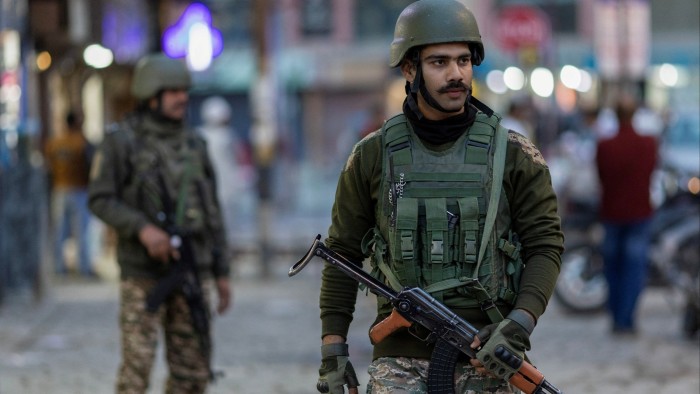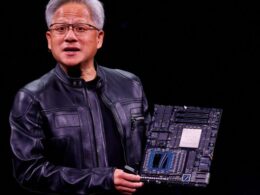This article is an on-site version of our FirstFT newsletter. Subscribers can sign up to our Asia, Europe/Africa or Americas edition to get the newsletter delivered every weekday morning. Explore all of our newsletters here
Good morning, happy Friday and welcome back to FirstFT Asia. On today’s agenda:
-
A sharp escalation in the India-Pakistan dispute
-
China lays out its conditions for US trade talks
-
Is this still the Asian century?
We start with the latest developments in the escalating dispute between India and Pakistan over an attack that killed 26 tourists in the disputed region of Kashmir.
What happened: Pakistan has closed its airspace to India’s airlines, said it would suspend a 1972 peace treaty with its larger neighbour, and warned that any diversion of shared river waters would be “considered an act of war”. New Delhi had already downgraded diplomatic relations with Islamabad and suspended its participation in a crucial cross-border water treaty over the attack.
India’s Prime Minister Narendra Modi yesterday vowed to “identify, track and punish” the backers of the gunmen responsible for an atrocity that shocked Indians and fanned fears of a conflict with Pakistan. Islamabad has denied any involvement in the attack in Pahalgam, a tourist destination in the Indian-controlled territory of Jammu and Kashmir.
What do these moves mean? India’s suspension of participation in the Indus Waters Treaty was an unprecedented measure and could be deeply damaging to Pakistan, a country mired in a deep economic crisis. The treaty guarantees Pakistan’s access to the three western rivers of the Indus basin — its main source of water for agriculture, power and daily life.
Michael Kugelman, a Washington-based South Asia analyst, said the Indus Waters Treaty and Simla Agreement — which has governed relations between the two countries since it was signed after their 1971 war — had served as “safety nets” ensuring a baseline of co-operation and communication at times of high tension between Pakistan and India. “The relationship risks entering uncharted territory,” Kugelman said. Read the full story.
Here’s what else we’re keeping tabs on today:
-
Economic data: Japan reports Tokyo CPI inflation rate figures, department store sales and trade statistics.
-
Companies: Reliance Industries, Ping An Insurance and Nomura Holdings report results.
How well did you keep up with the news this week? Take our quiz.
Five more top stories
1. China has told the US to “completely cancel all unilateral tariff measures” if Washington wants trade talks, in some of Beijing’s strongest comments on the deepening trade war between the world’s two economic superpowers. Beijing also denied President Donald Trump’s repeated comments that the two sides were holding trade talks.
2. Robotaxi company Pony.ai is considering a secondary listing less than six months after its US IPO, amid mounting concern that Trump’s administration will pursue delistings of Chinese companies. “It’s nothing concrete yet, but definitely it’s something we’re contemplating,” said James Peng, co-founder and chief executive, in an interview with the FT at this week’s Shanghai auto show.
-
More from the Shanghai auto show: Carmakers have been forced to tone down their promotion of autonomous driving functions in new models unveiled at this week’s exhibition after a safety crackdown by Beijing.
-
Nissan’s profit warning: The Japanese carmaker has warned of its biggest annual loss of up to ¥750bn ($5.3bn) on the back of higher than expected restructuring costs
3. South Korea’s economy contracted in the first quarter, with political turmoil hitting consumer sentiment in Asia’s fourth-largest economy while business concerns grew over Trump’s tariffs on exports to the US. Here’s why analysts warned that South Korea is “at the beginning of an economic crisis”.
-
SK Hynix profits double: The Korean chipmaker’s quarterly operating profit has more than doubled on strong sales of advanced memory chips used in AI products, amid stockpiling ahead of looming US tariffs.
4. Alphabet shares rose after it reported first-quarter profit had surged 46 per cent, driven by another good performance in its search business and the boom in AI-related demand for cloud computing power. The figures gave comfort to investors who have been watching closely for any softness in search because of the popularity of AI chatbots.
5. Trump has criticised Vladimir Putin over the latest deadly air strikes on Ukraine, signalling frustration with Moscow even as the White House steps up pressure on Kyiv to acknowledge a de facto change in its borders. Referring to Russia’s strikes, the deadliest and largest bombardment of the Ukrainian capital in months, Trump wrote on his Truth Social platform yesterday: “Not necessary, and very bad timing. Vladimir, STOP!”
News in-depth
Elon Musk’s multimillion dollar foray into electoral politics looked like one of the savviest investments of his career following Donald Trump’s election win in November. But, by Musk’s own admission, his allegiance to Trump has instead led to damaging “blowback” for his flagship electric-car maker Tesla. “It went from a Cinderella story to Nightmare on Elm Street,” said one analyst. Facing investor pressure Musk this week changed course. Can he help Tesla regain its competitive edge?
We’re also reading . . .
Chart of the day
Trump’s trade war with China has intensified the battle to control the market for critical minerals that are essential in products ranging from EVs to iPhones and military hardware — and underscored Beijing’s dominant position in it.
Take a break from the news
With the FT and Schroders Business Book of the Year Award launching today, Andrew Hill looks at how the publishing industry is grappling with the debate over artificial intelligence.
Find out more about the award here.

Source link










